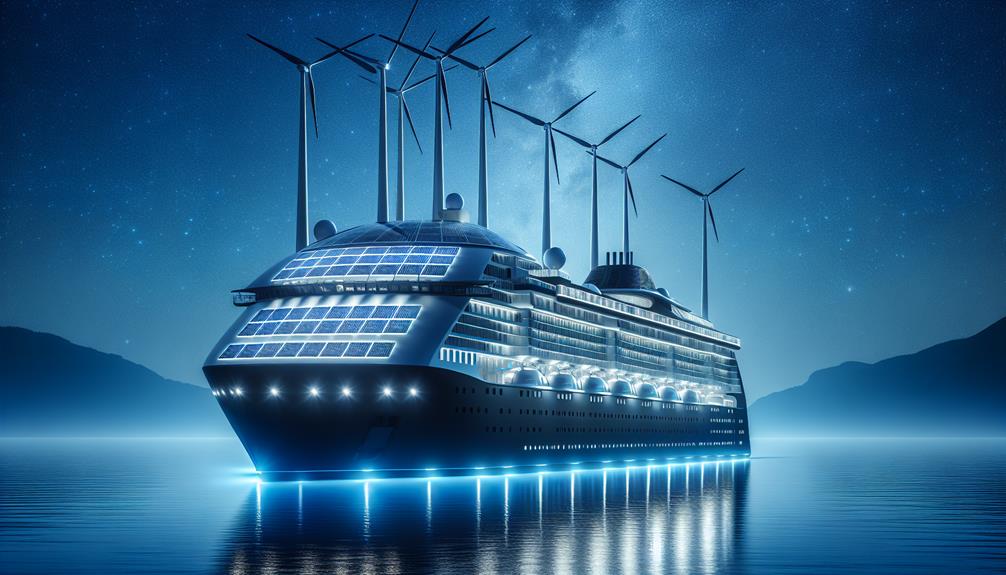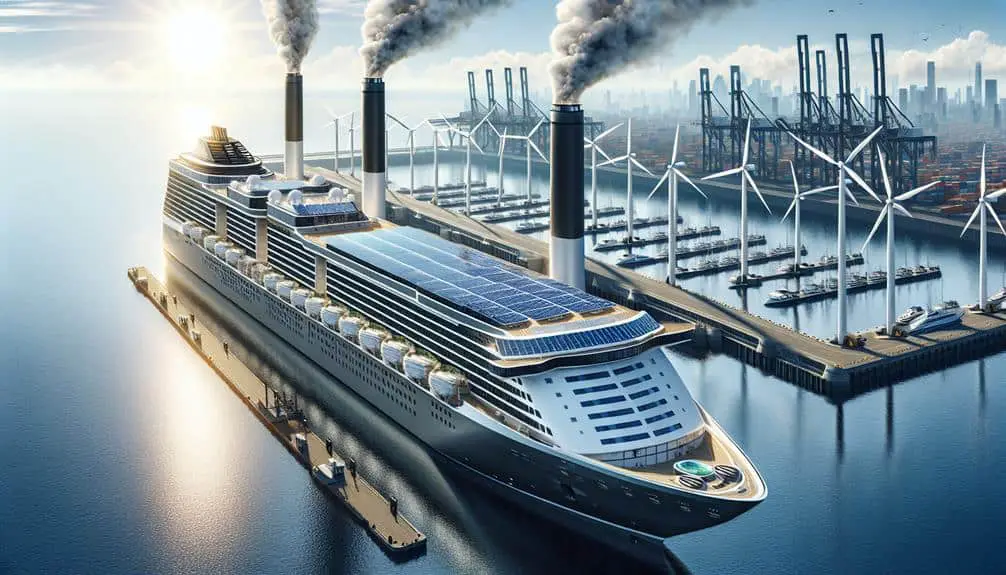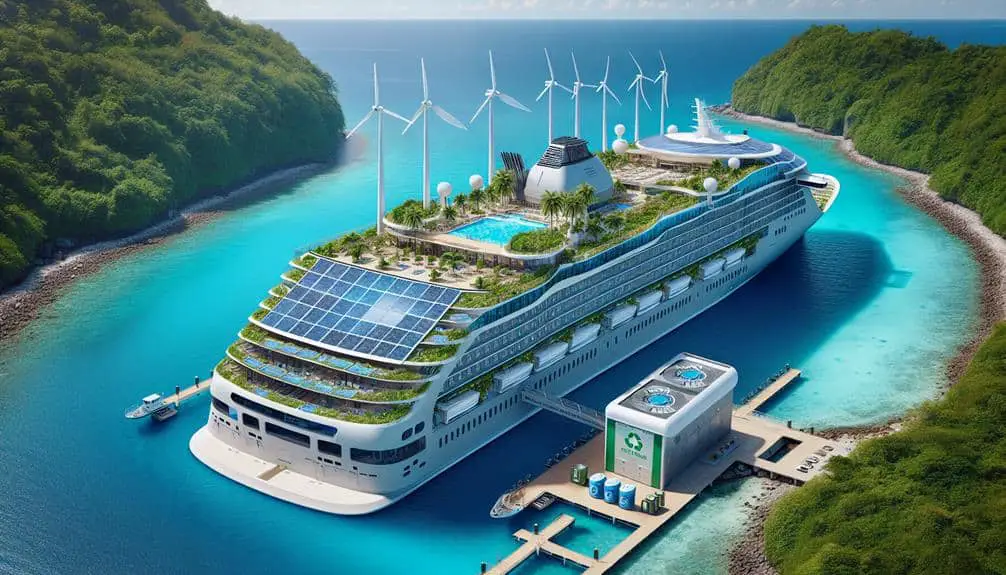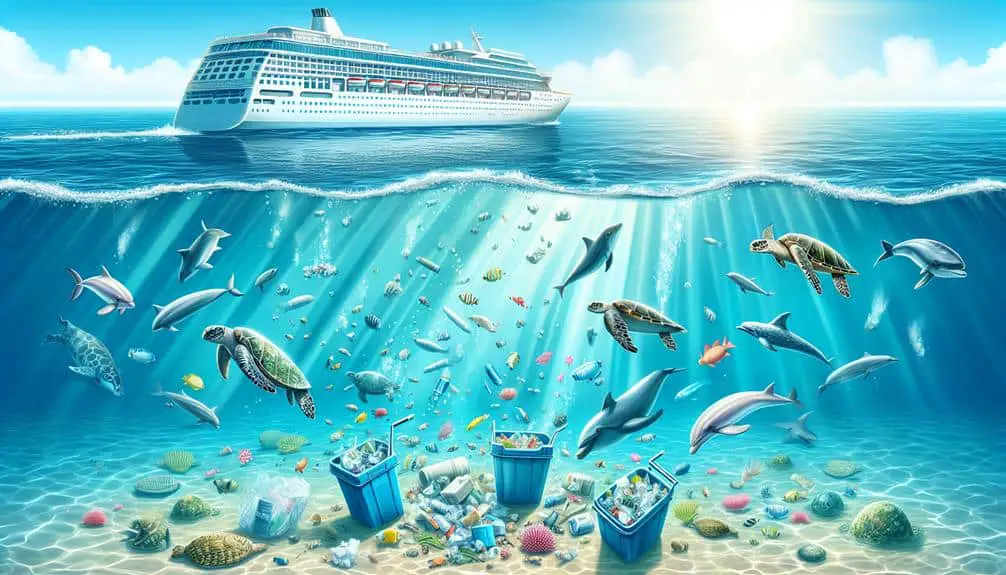Implementing energy-efficient technologies on cruise ships is crucial. They reduce fuel consumption, lower carbon emissions, and enhance sustainability efforts. Advanced propulsion systems, waste heat recovery, and LED lighting optimize operations. These technologies minimize environmental impact and promote cleaner ecosystems. Efficient systems lead to long-term cost savings and improved operational efficiency. Cruise ships must comply with stringent regulations on emissions control and safety protocols. Future trends focus on eco-friendly solutions like hydrogen fuel cells and green hull designs. Embracing energy efficiency is key to a greener and more sustainable maritime industry.
Key Points
- Energy-efficient technologies reduce fuel consumption and environmental impact on cruise ships.
- Advanced propulsion systems and waste heat recovery lower the carbon footprint significantly.
- Optimal energy usage through technologies minimizes waste for sustainable ship operation.
- Integration of LED lighting, solar panels, and shore power systems decreases emissions.
- Enhancements in efficiency benefit the environment and improve overall ship performance.
Impact of Energy-Efficient Technologies
Implementing energy-efficient technologies on cruise ships can greatly reduce fuel consumption and environmental impact. By incorporating innovative solutions such as advanced propulsion systems and waste heat recovery systems, cruise ships can markedly lower their carbon footprint. These technologies aim to optimize energy usage and minimize waste, ultimately leading to a more sustainable operation.
One key aspect of energy-efficient technologies on cruise ships is their ability to mitigate the environmental impact of these massive vessels. By utilizing innovative solutions like LED lighting, solar panels, and shore power connection systems, cruise ships can decrease their emissions and reliance on fossil fuels. These advancements not only benefit the environment but also enhance the overall efficiency and performance of the ship.
Benefits of Sustainable Practices
Utilizing sustainable practices in the operation of cruise ships yields important environmental and economic benefits. Implementing renewable energy sources and reducing waste play vital roles in enhancing the sustainability of cruise ship operations.
- Renewable Energy Integration: Incorporating solar panels, wind turbines, and other renewable energy sources can greatly reduce reliance on traditional fossil fuels, decreasing greenhouse gas emissions.
- Energy-Efficient Technologies: Utilizing energy-efficient lighting, HVAC systems, and propulsion systems can lead to decreased energy consumption and lower operational costs.
- Waste Management Programs: Implementing effective waste reduction and recycling programs onboard can minimize the environmental impact of cruise ships and contribute to a cleaner ecosystem.
- Water Conservation Measures: Installing water-saving technologies and promoting water conservation practices can help conserve precious freshwater resources during voyages.
- Economic Savings: Embracing sustainable practices not only benefits the environment but also leads to long-term cost savings through reduced energy and waste management expenses.
Cost Savings and Efficiency Measures
Embracing energy-efficient technologies on cruise ships can greatly enhance cost savings and operational efficiency. By optimizing fuel consumption through the use of advanced propulsion systems, waste heat recovery, and LED lighting, cruise lines can achieve significant operational savings. Modern cruise ships incorporate innovative hull designs and air lubrication systems that reduce drag, leading to lower fuel consumption and decreased operating costs. Implementing energy management systems that monitor and control power usage can further enhance efficiency and reduce overall expenses.
Operational savings are also achieved through the installation of shore power systems, allowing ships to connect to the local electrical grid while docked instead of relying on internal generators. This not only reduces fuel consumption but also minimizes emissions, aligning with sustainability goals. Additionally, investing in energy-efficient HVAC systems and advanced water treatment technologies can contribute to long-term cost savings and environmental stewardship. Overall, prioritizing energy efficiency on cruise ships isn't only economically beneficial but also essential for reducing environmental impact and ensuring sustainable operations.
Regulations and Compliance Standards
To ensure adherence to industry standards and environmental regulations, cruise ships must comply with a set of stringent guidelines governing their operations and emissions. Meeting regulatory requirements and industry standards is vital for ensuring the sustainability and safety of cruise ship operations. Here are key aspects related to regulations and compliance standards:
- Emissions Control: Cruise ships are required to limit their emissions of pollutants such as sulfur oxides and nitrogen oxides.
- Waste Management: Proper handling and disposal of waste, including sewage and garbage, are mandated to protect marine ecosystems.
- Energy Efficiency: Regulations often stipulate energy efficiency measures to reduce fuel consumption and greenhouse gas emissions.
- Safety Protocols: Compliance with safety standards, including emergency response procedures, is essential for passenger and crew well-being.
- Monitoring and Reporting: Cruise ships must regularly monitor and report their emissions and operational practices to regulatory bodies for assessment.
Adhering to these regulatory requirements and industry standards is essential for the cruise industry to operate sustainably and responsibly.
Future Trends in Eco-Friendly Solutions
Incorporating advanced propulsion systems can greatly enhance the eco-friendliness of cruise ships in the upcoming years. As the maritime industry continues to prioritize sustainability, innovative initiatives are being developed to propel cruise ships towards greener practices. One of the future trends in eco-friendly solutions for cruise ships involves the integration of hydrogen fuel cells as a power source. This technology offers significant environmental benefits by producing electricity through a chemical reaction of hydrogen and oxygen, with water vapor as the only byproduct.
Furthermore, green advancements in hull design, such as air lubrication systems and special coatings, aim to reduce drag and improve fuel efficiency. These improvements can lead to substantial fuel savings and decreased emissions, contributing to a more sustainable operation of cruise ships.
Frequently Asked Questions
How Do Energy-Efficient Technologies on Cruise Ships Impact the Overall Guest Experience and Satisfaction Levels?
Energy-efficient technologies on cruise ships have a notable impact on guest experience, enhancing satisfaction levels. Streamlined operations, improved air quality, and reduced noise levels create a more pleasant environment. These advancements contribute to a more enjoyable and comfortable voyage for passengers.
Are There Any Potential Drawbacks or Challenges Associated With Implementing Energy-Efficient Technologies on Cruise Ships?
When implementing energy-efficient technologies on cruise ships, you may encounter challenges. These include cost implications, ensuring regulatory compliance, providing crew training, and facing operational challenges. Balancing these factors requires careful planning and execution.
What Specific Sustainable Practices Can Be Adopted on Cruise Ships to Further Reduce Environmental Impact Beyond Just Energy Efficiency?
To enhance sustainability on cruise ships, focus on waste management by improving recycling processes. Implement water conservation measures like efficient usage systems. These steps reduce environmental impact beyond energy efficiency, promoting eco-friendliness in maritime operations.
How Do Cruise Lines Ensure That Their Energy-Efficient Technologies Are Constantly Monitored and Maintained to Ensure Optimal Performance?
To guarantee peak performance, cruise lines diligently monitor and maintain their energy-efficient technologies akin to a well-oiled machine. Routine inspections, data analysis, and swift repairs ensure excellent efficiency, reducing environmental impact.
Are There Any Emerging Technologies or Innovative Solutions That Could Further Enhance the Sustainability of Cruise Ships in the Future?
Incorporating future innovations and sustainability solutions on cruise ships is essential. Green technology holds the key to reducing environmental impact. Implementing advanced systems and practices will drive the industry towards a more sustainable future.




